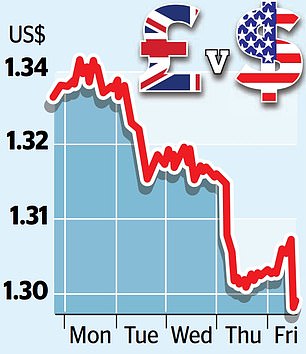Hopes for ‘aggressive’ interest rate cuts are fading
- Fed moves slowly after huge US job figures
- Top bank official calls for caution in Britain
Hopes for aggressive rate cuts faded yesterday on both sides of the Atlantic, dealing a blow to millions of borrowers.
US employment figures show 254,000 jobs were created in the world’s largest economy last month – beating the forecast of 140,000.
The strength of the US labor market surprised many observers – and fueled expectations that the US Federal Reserve will take a more gradual approach to cutting interest rates.
In Britain, the Bank of England’s chief economist Huw Pill called for “caution” as he warned against “cutting interest rates too far or too quickly.”
The comments were in stark contrast to language used by Governor Andrew Bailey a day earlier, who said the Bank could be “a little more aggressive” if inflation remains under control.
No rush to cut rates quickly: the prospect of a slow decline in interest rates in the US and Britain was felt in financial markets
The prospect that interest rates in the US and Britain would fall only slowly was felt in the financial markets.
With US employment data suggesting the Fed will not repeat last time’s huge 0.5 percentage point cut, the dollar strengthened further against the pound, with the pound falling below $1.31.
Sterling had risen to a two-and-a-half year high above $1.34 last week, but has fallen sharply in recent days. The yield on ten-year US government bonds – a measure of the cost of government borrowing – rose to just under 4 percent, the highest level in almost two months. Ten-year bond yields in Britain rose to their highest level since late July.
Fears of a deteriorating labor market had prompted the Fed to announce an interest rate cut of half a percentage point (or 50 basis points) last month.
Earlier this week, however, Fed chief Jerome Powell said there was no “rush to cut rates quickly” as those fears eased on positive economic data.
And Larry Summers, the former US Treasury Secretary, said yesterday: ‘In retrospect, the 50 basis point cut in September was a mistake.’
Matthew Ryan, head of market strategy at financial services firm Ebury, said the jobs figures should “ease lingering fears about the state of the US economy, which is not only growing at solid growth but also continuing to create jobs at a pace that continues to grow ‘. very healthy rate indeed’.

Ryan said a second consecutive half-point rate cut is now “off the table” and a more “standard” quarter-point rate cut is likely instead. Paul Ashworth, chief North America economist at Capital Economics, said: “The real debate at the Fed should be about whether monetary policy should be eased at all.
‘The hopes of a 50 basis point cut have long since disappeared. We continue to expect the Fed to take a more dovish approach.”
Adding to the swirling considerations for global rate setters is the conflict between Israel and Iran, which has already driven up oil prices sharply – a trend that, if continued, could also prove a hurdle in the battle to keep inflation low.
Speaking in London yesterday, Pill noted that it was the global shocks of the pandemic and the invasion of Ukraine that caused the latest inflation episode and that rate setters must remain vigilant.
He said it is “important to guard against the risk of interest rates being cut too far or too quickly,” adding that the need for “prudence” only points to a “gradual” reduction in borrowing costs.
DIY INVESTMENT PLATFORMS

A.J. Bell

A.J. Bell
Easy investing and ready-made portfolios

Hargreaves Lansdown

Hargreaves Lansdown
Free fund trading and investment ideas

interactive investor

interactive investor
Invest for a fixed amount from € 4.99 per month

Sax

Sax
Get £200 back in trading fees

Trade 212

Trade 212
Free trading and no account fees
Affiliate links: If you purchase a product, This is Money may earn a commission. These deals have been chosen by our editors because we believe they are worth highlighting. This does not affect our editorial independence.
